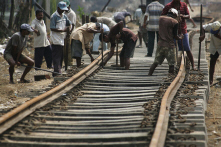
Typical street scene in Santa Ana, El Salvador. (Photo: iStock)
IMF Survey: Post-conflict, Brighter Economic Prospects for Sri Lanka
February 4, 2011
- Marked improvement in economic fundamentals
- Reforms to tax system needed for investment and reconstruction
- Ongoing reforms to financial sector and business environment
Sri Lanka, after emerging from a decades-long civil conflict, is seeing strong economic growth of 7.5 percent. The country now stands at a crossroads and needs to build on current reforms if it is to take full advantage of the favorable economic environment, says the IMF.

Repairing railtracks in Sri Lanka. Investments in infrastructure are part of the country’s recovery program post-conflict (photo: Xinhua/Corbis)
Rebuilding Sri Lanka
Three decades of war distorted Sri Lanka’s economy, hindered development, and reduced the country’s potential growth. But since the end of the conflict in 2009 and with the help of an IMF loan program, the country’s economic fundamentals have improved markedly.
"This is a critical moment for Sri Lanka and it now needs to continue to implement reforms to maximize its growth potential and ensure the benefits of growth are broadly distributed” said Brian Aitken, the IMF’s mission chief for the country, during a regular review of the IMF-supported program.
Recovery after conflict
Since 2009, the IMF has been assisting the island nation with a $2.6 billion loan program designed to help the country recover from a balance of payment crisis triggered by the global financial crisis and return it to long-term, sustainable growth.
Over the past few decades, Sri Lanka’s public debt grew to unsustainable levels as military spending and debt service costs increased, and budget revenues fell. Its economic difficulties were compounded by the shock of the recent global crisis.
Although the country’s fiscal position is still weak—Sri Lanka has one of the highest public debt-to-GDP ratios among emerging market countries—this is expected to fall steadily over the coming years, while inflation and monetary conditions have eased. The economy is rebounding.
Boosting investment in reconstruction and infrastructure
Higher potential growth will require higher investment and the government has already launched a comprehensive public investment program to address gaps in the country’s infrastructure and reconstruction in the north and east of the country.
With the help of foreign donors, Colombo plans to spend around $1½-2 billion a year on road and rail development, power production, port facilities, and water and sanitation.
The government also recognizes the need for increased investment in not only physical, but also human capital.
Toward a more equitable tax system
To help generate money for increased spending, and keep deficits under control, the IMF has supported a fundamental reform of the tax system. In the 2011 budget, the Sri Lankan authorities proposed measures to simplify the tax system, broaden the tax base, reduce rates, and spread the tax burden more equitably. This will also boost the amount of tax collected.
The measures aim to reverse the distortions to the country’s tax system introduced during the civil conflict when, in a bid to attract domestic and foreign investment, the government introduced sweeping tax concessions. This had the effect of eroding the tax base, and the tax system became increasingly ad hoc, with a narrowing proportion of economic activity being taxed at high rates.
“The government’s tax reform is critical to create the fiscal space for much-needed reconstruction and infrastructure investment, as well as increases in social spending, while ensuring the fiscal deficit is put on a downward path” said Aitken.
Easing the way for investment
But the country’s overall investment needs cannot be met through the public purse alone. Private sector investment will have to play a critical role. As well as preserving macroeconomic stability, ensuring external competitiveness, and facilitating capital market development, the authorities also need to undertake a wholesale reform of the investment regime.
The government has already set itself the task of improving the business environment and building on its ranking in global competitiveness league tables.
The IMF loan program also included measures to help financial sector reform, including improvements to the country’s regulatory framework and the development of domestic financial markets to finance higher private sector investment.
Looking ahead
In the future, the country’s growth prospects will depend on its success in graduating from its traditional drivers of growth, such as exports of garments, tea, and other agricultural products, and begin taking advantage of its strategic location and comparative advantage in services.
“Greater regional integration, capitalizing on Asia's growth will promote higher growth. This should be coupled with growth in the export of services such as transshipment and cargo, IT, business processing, and outsourcing,” said Aitken.


